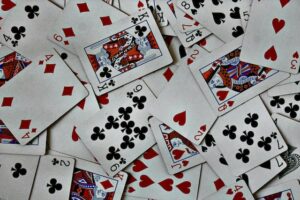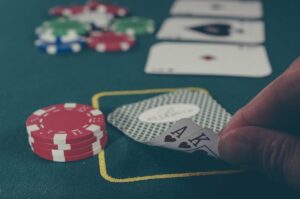 The latest figures published by the NJ Division of Gaming Enforcement have revealed a continued decline in revenues generated by online poker in New Jersey.
The latest figures published by the NJ Division of Gaming Enforcement have revealed a continued decline in revenues generated by online poker in New Jersey.
Each month the NJ Division of Gaming Enforcement publishes monthly gross gaming revenue reports related to online gambling in the Garden State; and, for the third month in a row, revenues generated by online poker in New Jersey have fallen.
In June, online poker in New Jersey generated $1.83 million in gross gaming revenues – down 4.8% on May´s figures and down more than 10% on June 2014. Since the first full month of gaming revenues was published in December 2013, gross gaming revenues from online poker have fallen a total of 36%.
Whereas the latest month-on-month comparisons could be blamed on the traditional “quiet season”, this does not explain the year-on-year decline. Furthermore, even more alarming is that the combined revenues for the “quiet season” of June, July and August 2014 ($6.445 million) were far more than the combined revenues for October, November and December 2014 ($5.093 million).
All is Not Well in the State of New Jersey
Once the inspiration for regulated online poker in the US, the fortunes of online poker has deteriorated to such an extent that other states must be considering whether it is worth going through all the grief and political posturing to introduce legislation of their own.
Expectations that a mature market would deliver better results have failed to materialize and, were it not for the buoyancy of online casino revenues, operators such as WSOP/888 and Party/Borgata would be flipping a coin to see who will exit the New Jersey market first.
There are a number of reasons being suggested why all is not well in the state of New Jersey and the most credible theories include high tax rates, a lack of shared liquidity with other states and the hoops that affiliates have to jump through in order to promote online poker in New Jersey.
Ultimately it is the Players that Suffer
Each of the reasons promoted for the decline of online poker affects the players. High tax rates influence the rake and fees that are charged by the online operators, while the lack of shared liquidity means that the value of tournaments is decreased and the level of traffic suffers.
Due to the licensing requirements and limited opportunities, affiliates – historically the lifeblood of online poker sites – have little incentive to attract new players from New Jersey to the game, especially when unregulated sites have a larger marketing budget to pay more substantial rewards to affiliates for new players.
Indeed – according to Rachel Hirsch from Ifrah Law – if a novice player in New Jersey searched the Internet for “online poker”, the first page of results they would see would be affiliate marketing sites promoting offshore, unregulated poker rooms. If the player was unaware that a regulated market existed in New Jersey, he or she could easily believe they were registering for a bone fide account.
Still No Sight of PokerStars
Many observers have suggested that the entry of PokerStars into the New Jersey online poker market will revive the industry´s flagging fortunes, but this is not necessarily the case. The same taxes, ring-fenced market and lack of opportunities for affiliates will still apply; and despite forecasts from politicians and the company´s owners, there is still no news about dates when PokerStars NJ will be launched.
Furthermore, when/if PokerStars opens for business, most of its players will come from the existing databases of 888/WSOP and Party/Borgata, and – if the history of online poker in New Jersey repeats itself – the initial spike of interest will dissolve once players realize that the regulated version of the site is not as profitable as the unregulated version they remember pre April 2011.
The signs are not good for online poker in New Jersey, but it is hoped that other states contemplating the regulation of online poker look at New Jersey to see what has gone wrong and avoid the mistakes that have been made in the Garden State. There seems to be no attempt by the regulators or the operators to reverse the declining fortunes of online poker in New Jersey and, as usual, it will be the players who pay the price for regulation.



